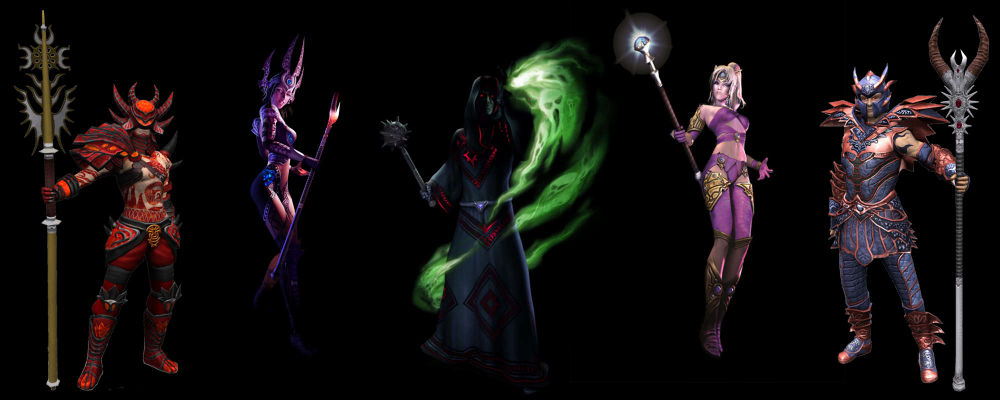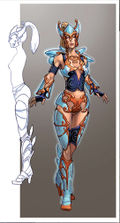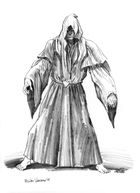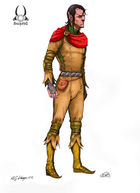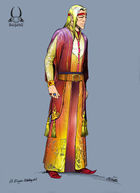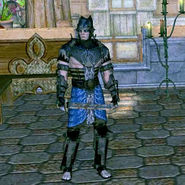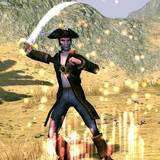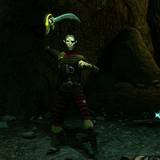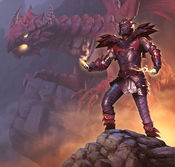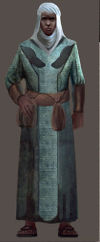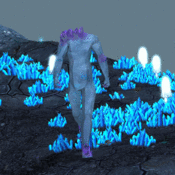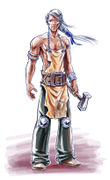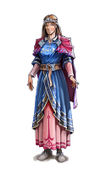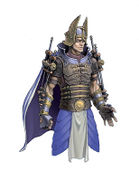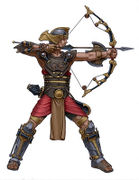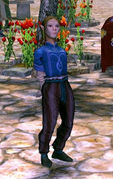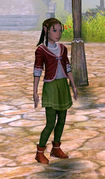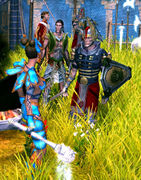Elves are the dominant race in Ancaria, and the most populous and widespread. No place is untouched by their far-reaching exploration or their ancient history. The Elven societies represent the height of civilization and progress in Ancaria, though they are not without their dark side. Four of the seven playable characters in Sacred 2 are Elves or descendants of Elves: The High Elf, the Inquisitor, the Dragon Mage, and the Dryad.
History
Long ago, the Seraphim passed their mystical knowledge on to their favored race, the Elves, so that they could benefit from T-Energy. T-Energy helped the realm of the Elves to experience an incomparable boost of prosperity, making it the reigning culture in Ancaria.
A force which contains the enormous power of T-Energy carries great dangers. The children of Ancaria were not taught how to deal with this.
Soon there was a heated dispute among the Elves as to how and to what purpose the T-Energy was to be used. Every party wanted to use the power. The dispute changed to irresolvable conflict, causing a rift between the Elves. A terrible Civil War raged among the Elves, with many deaths and horrific losses on all sides. Their realm collapsed and with it the entire power structure. When the war came to an end, the Elves segregated into several tribes. The ancient ruins of their homeland were abandoned and forgotten and can now be found overgrown with vines in The Jungle region.
Some tribes of Elves steadfastly refused to harness the creative energy and turned to nature as a new way of life, eventually becoming Dryads. Those High Elves advocating the use of creative energy divided into two factions: The first worked to return the world and its races back to its former glory and relative stability, while the second - a largely religious group - intending to use the creative energy to spread a "cleansing" fire over Ancaria. These Elves were determined to emerge as leaders when the fire fulfilled its purpose. Another civil war looms menacingly on the ever-darkening horizon.
High Elves
High Elves are free Elves who fled from the south a great many moons ago. High Elven nobility holds sway over the northern regions of Ancaria; controlling T-Energy streams and the Great Machine itself. However, the powers of the High Elves are limited as only the High Priests have direct access to the T-Energy streams and the Great Machine.
|
|
The player can take on the role of a young female High Elf magician from a noble house of Tyr Lysia. The Masters of the academy send their best student to find out what is going on in Ancaria. That is the moment the High Elf has been waiting for! Finally, she will be able to use her magical abilities and to prove her wisdom.
|
The Elves live in a feudal society where most of the Elves are commoners and serfs, with a privileged nobility ruling over them. The Elves use Humans as servants, and are highly prejudiced against them.
Inquisitors
The Inquisitors are High Priests. Originally, these were the connection between the rulers and the Great Machine. Over time, they started to abuse their powers and they attempted to become involved with politics. Now, the High Priests are secretly breeding demons and other disgusting creatures in order to seize power over Ancaria.
|
|
The player can take on the role of a dark and ruthless Inquisitor. He is as deadly as he is arrogant and he has only his own interests at heart. The fate of the other inhabitants of Ancaria does not concern him. He is determined to see the High Elven clergy in absolute control of T-Energy.
|
- See also: Sacred 2:Art of Ancaria
Tyr Lysia is the High Elf homeland, mainly inhabited by the descendants of Southern Elves who migrated there a long time ago. Farmers, fishermen, and craftsmen are governed by both nobility and the clergy who lease land and collect taxes (usually food, goods or money. The villages consist of simple houses, the inhabitants are friendly, but not very outgoing around strangers. There are altars and small cult sites in almost every village. They are usually decorated with flowers and grain ears. High Elves believe in a large pantheon of deities. Villages show their wealth through the number and sizes of their altars. Poor villages usually only have one altar that all deities must share. Humans serve the noblemen in their mansions or work as farm hands in rural areas. Only rarely does one come upon a Human craftsman. Most Humans are servile, however some (mostly free Humans) tend to be brazen and rude.
Country Elf, City Elf
There are two main types of High Elves in Tyr Lysia: city Elves and country Elves.
|
|
Country Elves are simple people, who work the land for their lords. Their homes are functional and comfortable, without being ostentatious. They don't have the luxuries that their city brethren have, but they're also safely removed from much of the strife that occurs. They work hard, but have a good and honest life – as long as their lord is happy and nature doesn't inflict drought or flooding on them.
|
|
|
In and near the capital city of Thylysium, the city Elves dominate the population. City Elves don't have feudal masters like their country cousins, and their numbers span the social spectrum ranging from nobility, clergy, merchants and tradesmen. The nobility have townhouses here, and the nobles serve in the Senate. The clerics serve in the Temple, and generally live close by. As you look at the outlying city, further from the city center, you see more of the dwellings and businesses of the merchants and tradesmen.
|
The High Elf Capital:Thylysium
The population in Thylysium consists mainly of High Elves. The grand city is governed by a Senate. Among its members are merchants, priests, and noblemen. They are the upper-class of Thylysium and live in large townhouses. Leaving the broad streets one soon comes across an astonishing number of different languages, smells, and faces. People come to Thylysium from all parts of Ancaria, sometimes to trade, sometimes just to satisfy their curiosity. Some are rich, some poor,- there are merchants and laborers, fishermen and thieves. Travelers should be aware that a friendly face often hides a drawn dagger. One should also avoid the town guard as its soldiers are known for taking bribes and are often in league with one of the many gangs in town.
Political Strife
Due to problems with the T-Energy streams and the Great Machine the influence of the High Elven nobility is slowly dwindling and in certain areas civil war has already broken out. This has recently led to an increasingly tense atmosphere between Nobles and High Priests. Additionally, the ruling bodies no longer see eye to eye in many cases. Everyone holding a position of power is attempting to secure his or her influence during these times of insecurity.
|
|
|
High Elf Soldiers. The executive powers do not lie in the hands of the High Elven rulers (except for a few special factions) but instead lie with “created” or bred soldier-like creatures. While the world around them is deteriorating the High Elven generals are losing control over their units. Insurrection and plundering are now commonplace.
|
Pirates and Brigands
- See also: Sacred 2:High Elf Enemy
Corrupt High Elves have a wide variety of occupations, ranging from thieves and bandits to buccaneers and pirate captains. Adventurers who dare to approach their territories often find themselves lighter in the wallet or at the point of a dagger. Stealth is important when traveling the roads of Tyr Lysia, and a good strong shield to block oncoming arrows is recommended.
|
|
|
In addition to a number of Elven theives, bandits, and brigands, the player will also encounter and fight two groups of Pirates in Tyr Lysia: The Bluestone Pirates, who can be found in Eastern Tyr Lysia near Bluestone Lake, and the Jade Buccaneers, who occupy the South-Western areas along the Golden Coast of the Jade Sea.
|
Dragon Cults
For centuries, the Elven cult of the Dragon Mages has thrived in the remote regions of the world, in places like the extreme south, beyond the sea, or in the vast system of underwater caverns in the Dragonsea to the north. The members of these cults are not only respected but also accepted by dragons and live together with them in a community. Only a chosen few are granted the honour of being instructed by the dragons for training in the ancient dragon magic.
|
|
The Dragon Mage, a playable character added in Ice and Blood, is part of one such cloak-and-dagger dragon cult from a distant southern island. For the adepts studying the magic of the Dragons, there is only one goal, for which they would be willing to do anything: gain the title of "Dragon Mage." Only the most powerful who complete this training are capable of assuming the form of a dragon and of using the concentrated power of dragon magic. Only they have the privilege of being allowed to carry the coveted title.
|
Only a few beings are dumb enough or proud enough to challenge the desert. No one knows why the descendants of Elves are among them. They roam the land as nomads, traveling from one oasis to the next and live off goat meat, dates, cacti, and milk. With Elf merchants who come on ships they trade gems and salt from the mountains and get food, clothing and weapons in return. The desert tribes are no seamen and tend to remain near the coast when they go fishing in their longboats. They almost never stay at sea during the night.
|
|
The tough desert life has changed the Elves' appearance over the long centuries. Most are thin, with dark leathery skin. Their eyes are slitted as if from staring too long at the sun. In contrast to their ancestors they only pray to one God: Testa, the God of science. Every tribe follows their own interpretation of the holy scriptures. During large gatherings this can lead to heated theological debates, but these rarely turn violent.
|
Strangers are welcome in Bengaresh and are usually greeted with calm friendliness. The desert tribes are always helpful, but never brash. Behind the black scarves that protect their faces from the sun and the sand hides a dry sense of humor that has surprised many travelers. Maybe this is the result of the constant struggle against a land that seems set on killing all life on it. Whatever the reason, a sense of humor is more than welcome around the camp fires of the tribes.
Elves in Other Regions
High Elves can be found in literally every Region of Ancaria, whether they are establishing trade, colonies, or simply exploring for the sake of it. However, special mention must be given to the Hucin:
|
|
"Sadly, the region which has been turned into our hunting ground was not wholly unpopulated. It seems there had been a few small villages inhabited by High Elves. But it is how they say: Sometimes you have to weigh necessity against cost. In this case, the cost was obviously worth it. In short: The Hucin once were elves that were at the wrong place at the wrong time. Now they add to our hunting experience." - From the Seraphim Guidebook of the Huntress.
|
Formerly Elves, these mutated, headless crystal creatures now roam aimlessly across the Crystal Plane, indiscriminately attacking adventurers and existing solely for the sport of the Seraphim.
| Flag of the High Elves
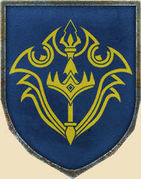
|
Flag of the Inquisition
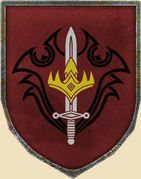
|
Thylysium Senate
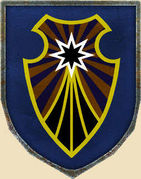
|
More Elf Pictures
- See also: Sacred 2:Renders
